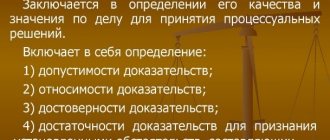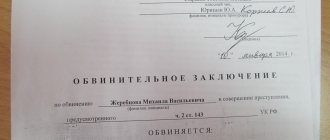Does evidence obtained in violation of the law have legal force?
In legal and judicial practice, evidence in a case is considered to be information and facts that were revealed during the pre-trial investigation or directly in court proceedings.
In essence, this is the result of cognitive activity that contributes to the establishment of truth. Lawyers call this activity evidence. It provides for several successive stages of working with evidence, namely:
- Collecting.
- Consolidation.
- Examination.
- Grade.
The legislation of the Russian Federation clearly indicates that all evidence in a particular case must be collected and processed in accordance with procedural rules.
Accordingly, facts and information obtained in violation of the law have no legal force, and therefore cannot act as evidence in a trial.
Unfortunately, opposing parties often try to present to the court evidence that was discovered and processed in clear violation of the law.
If the violations were insignificant and it is possible to restore the truth by performing certain procedural actions, then such “errors” can be considered insignificant.
For example, if, for some reason, the witness did not sign the crime scene inspection protocol, he can be questioned directly in court. If the witness's testimony completely coincides with the contents of the inspection protocol, the identified evidence may be added to the case.
Evidence that was identified and recorded with serious violations of the law is considered inadmissible and is not taken into account by the court.
It should be noted that there are constant discussions and consultations between lawyers and legal scholars around the question of what kind of evidence should be considered obtained in violation of the law.
This is a completely natural process, which will ultimately lead to a clear understanding of the norms of the law, which will ensure the most fair process of proving the truth.
What evidence is inadmissible?
- Facts and information provided by the suspect or accused during the pre-trial investigation if the interrogation was conducted without the presence of a lawyer. This is true even when the accused himself refuses the services of a defense lawyer or denies the previously given testimony directly at trial.
- Information provided by a witness or suspect, which is based only on rumors, conjectures, and personal reflections.
- Information and facts, the source of which cannot be determined.
- If the subject of proof presents to the court evidence that was obtained in violation not only of the Code of Criminal Procedure of the Russian Federation, but also of any other norm of current legislation.
- If during the discovery of evidence human rights were violated, the protection of which is guaranteed by the Constitution of the Russian Federation.
- In cases where evidence and evidence were collected by an unauthorized person or in clear violation of procedural requirements.
Fatal procedural violations in which evidence is considered inadmissible
- Illegal psychological or physical influence used by one of the parties to the process in relation to the other.
- Deliberately misleading an accused, witness or suspect in order to obtain the required information or provoke certain actions by the subject.
- Silence of the legal rights of the subject of litigation, in cases where the absence of this information violates the principle of equality of parties.
- Obvious ignorance of primary sources of information and, as a result, argumentation of a legal position based on derivative sources. Since the reliability of such evidence is quite difficult to verify, the equality of the parties is directly violated. First of all, the subject of the proceedings suffers, against whom this information and facts are directed. For example, when during a trial one of the opposing parties presents to the court, in the form of evidence, a protocol of interrogation of a witness who is currently absent from the courtroom. This deprives the other side of the opportunity to directly question the person who has information about the case.
- Legal grounds that may become a reason for recusal of an investigator, investigator, prosecutor, judge or other participants in procedural actions who took part in the collection of evidence in the case.
- If investigative and procedural actions were carried out by persons who are not related to this casework and cannot provide documents confirming the legality of their actions. For example, a written order from an authorized person, etc.
So, the legislation of the Russian Federation guarantees full protection of human rights, even if he is the subject of legal proceedings. Legislative norms ensure absolute equality of the parties and clearly define the mechanism of procedural actions.
Thus, a reasoned and maximally fair court decision is ensured.
( 2 votes, average: 5.00 out of 5)
Example
Let’s say that operational officers carried out a control purchase of a narcotic substance and entered the premises against the will of the citizens living there without obtaining permission from the court. The corresponding requirement is established by Article 8 of the Federal Law “On Operational Activities”.
If a narcotic substance, as well as banknotes found on the premises, were examined in compliance with procedural rules, then, within the meaning of Part 1 of Article 75 of the Code of Criminal Procedure, they should be considered admissible. In fact, the requirements of the Code were not formally violated.
Meanwhile, the actions taken contradict the requirements of the said Federal Law. Accordingly, the discovered objects act as inadmissible evidence. In criminal proceedings, it is important to comply with all procedures provided for by law. Otherwise, cases of violation of constitutional rights and personal freedoms are likely.
Improper Subject
The Code of Criminal Procedure contains an exhaustive list of persons authorized to collect evidence. These include an investigator, a defense attorney, an inquiry officer, and a prosecutor. The list also includes a court. Accordingly, protocols of investigative measures cannot be attached to the case materials if there is no resolution on:
- The employee's acceptance of the case for production.
- Creation of an investigation team (group).
- Transferring the case to another authorized body.
Evidence is considered inadmissible if:
- There is no separate instruction to another authorized employee to carry out an investigative action.
- The investigator's activities were carried out without initiating a case.
- The materials were checked for more than 10 days.
- There were violations of the principles of investigative jurisdiction/jurisdiction.
Properties of forensic evidence
The legal doctrine distinguishes the following properties of judicial evidence:
- relevance;
- admissibility;
- reliability;
- adequacy.
The first 2 properties from the list are enshrined in the Civil Procedure Code of the Russian Federation (hereinafter referred to as the Civil Procedure Code of the Russian Federation) and the Arbitration Procedure Code of the Russian Federation (hereinafter referred to as the Arbitration Procedure Code of the Russian Federation). The property of the reliability of evidence is disclosed only in the APC, while at the same time the Code of Civil Procedure calls all 4 properties necessary when assessing evidence. Admissibility of evidence is a property that requires proof of certain circumstances only with evidence specified by law.
Accordingly, inadmissible evidence is evidence the use of which is prohibited in the process.
We recommend reading the article on the ConsultantPlus website “The relationship between the admissibility of evidence and its relevance and reliability.” If you do not yet have access to the ConsultantPlus system, you can register for free for 2 days.
Additionally
Information collected by authorized employees, in respect of which challenges may be filed due to circumstances that are essential for the continuation of proceedings, is also considered as inadmissible evidence in criminal proceedings.
Judicial practice proceeds from the fact that the subject composition of legal relations must be appropriate. The recusal of one of the participants in the proceedings can be declared for various reasons.
For example, if a person has an interest in the outcome of the case. In addition, in the event of an unlawful change in the subject composition that could upset the balance in favor of any of the participants, information collected after this is considered as inadmissible evidence.
Nuance
When analyzing inadmissible evidence in criminal proceedings, the main features of such information provided for by law, it is necessary to pay attention to one important point. In paragraph two of part 2 of article 75, the testimony of a witness taken from a source whose origin he cannot describe is not accepted when considering the case.
Meanwhile, such a restriction is not established for the victim. The absence of appropriate instructions in the norm is probably due to the fact that the victim himself is the primary source of information. Accordingly, he is unlikely to be able to testify based on hearsay.
Inappropriate source
Information received from:
- From a person who is unable to adequately perceive what is happening due to his mental or physical characteristics.
- From a subject who cannot indicate the source of information.
- From minors 14-16 years old, interrogated in the absence of a teacher.
- Without warning the citizen’s relatives about the rights enshrined in Article 51 of the Constitution.
- From a person interrogated as a witness, if he is involved in the case as a suspect.
- Without checking the citizen's identity.
Written explanations and statements certified by a notary will also be considered an improper source, including if, according to the rules of the Code of Criminal Procedure, the information must be recorded in the protocol.
Rules
The current Code of Criminal Procedure provides for a procedure for declaring evidence inadmissible. In criminal proceedings, all participants have certain rights. These include the opportunity to file petitions. According to Article 88, if appropriate circumstances exist, the investigator, prosecutor, or interrogating officer must follow the procedure for declaring evidence inadmissible.
In criminal proceedings, the petition is considered the main factor that triggers this procedure. It can be filed by the accused or suspect. In addition, the prosecutor, inquiry officer or investigator can take their own initiative if they have doubts about compliance with procedures when obtaining information.
Remediable and rebuttable violations
They are actions whose results can be corrected. If it is established that non-compliance with the procedure led to a real violation of the adversarial principle, the information and materials obtained during it must be considered legally void.
Accordingly, the actions taken are irreversible. These, for example, include obtaining testimony from a witness with the use of violent actions, torture, and cruel treatment that degrades his dignity and honor.
Such actions do not meet the requirements of fairness and equality of parties. However, not all violations, including fatal ones, committed during production are considered significant when obtaining evidence.
For example, the presence of persons under 16 years of age at a hearing is considered as non-compliance with legal requirements. Moreover, this violation does not matter for the procedure for obtaining information necessary for production.








